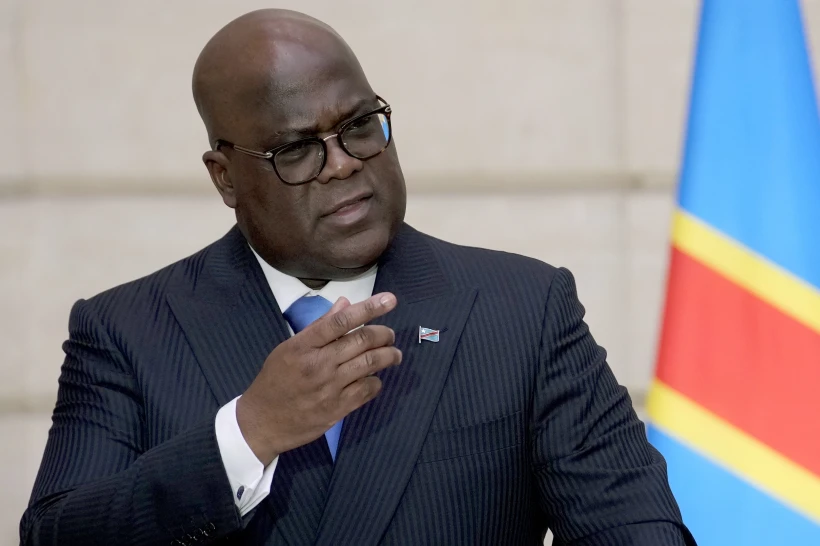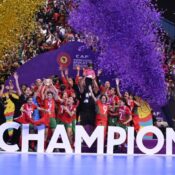
Congo considers a review of its laws that could affect Tshisekedi’s term
The opposition worries that the Tshisekedi dictatorship may utilize the proposed Constitutional review to prolong its rule in the Democratic Republic of the Congo.
In his own words, President Felix Tshisekedi has stated that the Democratic Republic of the Congo requires a “worthy” constitution.
During his trip this week in the northeastern area of Kisangani, the Congolese leader has been informing audiences that he will form a commission to consider and prepare a new constitution.
“Next year, a national commission comprising Congolese individuals from various disciplines will be appointed by me to reflect and provide us with a constitution that is tailored to our realities,” he declared on Wednesday.
He believes that Congolese nationalism is not reflected in the current legislation.
“This is a bad constitution. It was written by foreigners, in another country. “Our way of life must be the foundation of our constitution,” he declared.
After a referendum, the DRC’s constitution was enacted in 2006. In order to break the cycle of violent accession to power and establish an election-based democracy, President Joseph Kabila and the legislative majority at the time had urged the Congolese people to vote for it.
Étienne Tshisekedi, the father of the current president of state, led the opposition at the time and demanded that it be rejected. However, when some Kabila regime members proposed revising it in 2015, the opposition fiercely opposed it, causing the president to back down. Félix Tshisekedi and other opposition leaders had suspicions that the president was trying to find a method to stay in office.
Now that the argument has returned, the opposite is true. The UDPS party, led by President Tshisekedi, has publicly begun a campaign to amend the constitution.
According to Augustin Kabuya, Tshisekedi’s right-hand man and the party’s acting chairperson, the constitution “has demonstrated its limitations in the exercise of public power; it has to evolve to be properly adapted to the political management and progress of Congolese society,” as stated at the start of October.
No one at the UDPS has formally mentioned changing elected officials’ mandates or term limits thus far. A president may hold office for a maximum of two terms under DRC law. He is Tshisekedi’s second.
“Only the people, not the president, can decide to change that,” the president stated.
However, a number of UDPS politicians have previously voiced their opinion that the president is actually only serving three of the five years as the constitution stipulates. For them, two years of the head of state’s mandate are consumed by the preparations for elections at the end of a term and the arrangements for forming a government at the start of a term.
Tshisekedi declared, “This is not normal.”
According to the Congolese leader, the constitution requires an excessive number of drawn-out steps in the establishment of institutions following a fresh election.
“For example, I was inaugurated on January 20, 2024, but the government only took office in June,” he stated. He continued: “We need a constitution that will not handicap the functioning of the institutions.”
The opposition thinks Tshisekedi just wants to maintain power, despite his claims that he wants to provide the Congolese with an eternal constitution.
The true goal of amending the constitution, according to opposition leader Moïse Katumbi’s spokesperson Olivier Kamitatu, is “to enable Félix Tshisekedi and his clan to retain power for life and continue to rule Congo.”
Katumbi has promised to fight against any legal changes.
He declared, “This law will not be changed.”
Martin Fayulu, the other opposition leader, has vowed to “block the road.”
“I’ll join the crowd there. Similar to what I did with Kabila, I will obstruct Mr. Tshisekedi. “We will stop Tshisekedi from tampering with our constitution,” he declared.
Fayulu disagrees with the notion that institutions cannot operate effectively because of the constitution.
“Quote me a single article of the constitution that prevents Tshisekedi from working,” he replied.
Additionally, the Catholic Church is “advising against” it through its bishops.
“This matter has the potential to destabilize the nation, particularly given the current state of instability,” stated Monsignor Donatien Nshole, General Secretary of the National Episcopal Conference of Congo.
The “today’s politician, who favors only his own interests” was chastised by the clergyman.
Nobody knows how the parties surrounding Félix Tshisekedi would respond, and the opposition is united in opposing any constitutional amendment.
All Categories
Recent Posts
Tags
+13162306000
zoneyetu@yahoo.com



